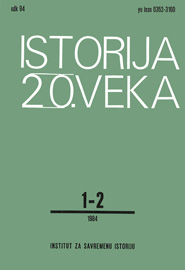PRIMENA PSIHOANALIZE U ISTORIOGRAFIJI
THE USE OF PSYCHOANALYSIS IN HISTORIOGRAPHY
Author(s): Žarko MartinovićSubject(s): History, Psychology, Psychoanalysis, Methodology and research technology
Published by: Institut za savremenu istoriju, Beograd
Keywords: psychoanalysis; historiography; methodology; psycho-historian;
Summary/Abstract: Psychoanalysis applied in history developed as the method and interpretative model which searches for the function of the unconscious as it is evidenced in various manifestations such as the life-styles, adaptation, creativity, character, slips of the tongue, hearing and writing, dreams, neuroses and psychoses, human action and its inhibitions. One of its primary postulates is that the unconscious »demands hearing and will not to be silenced«, fill the whole truth about man and his world is to be reached. As every history, this field encompasses the importance of the beginnings, antecedents and rehearsal models. This is exemplified by the significance given to the role of history of childhood, family, collective biography and prosopography. Present-day reality is constantly interreacting with the personal and social realities which are linked in the unconscious. The elucidation of these links is achieved by the use of psychoanalysis. Psychoanalytic history gives due place to the role of aggressivity, sexuality, passions, fantasy and emotional states of the inner world of examined or studied subjects. It rejects the myth of a sexuality and innocence of either child, adult, male or female. Psychoanalysis is able to provide the latent content behind the manifest fantasies and meanings perceived by the historian. When used in an expert way, psychoanalysis provides the psycho-historian with a powerful research tool to recognize the psychological dimensions of historical events and human past.
Journal: Istorija 20. veka
- Issue Year: 1984
- Issue No: 1+2
- Page Range: 125-146
- Page Count: 22
- Language: Serbian

